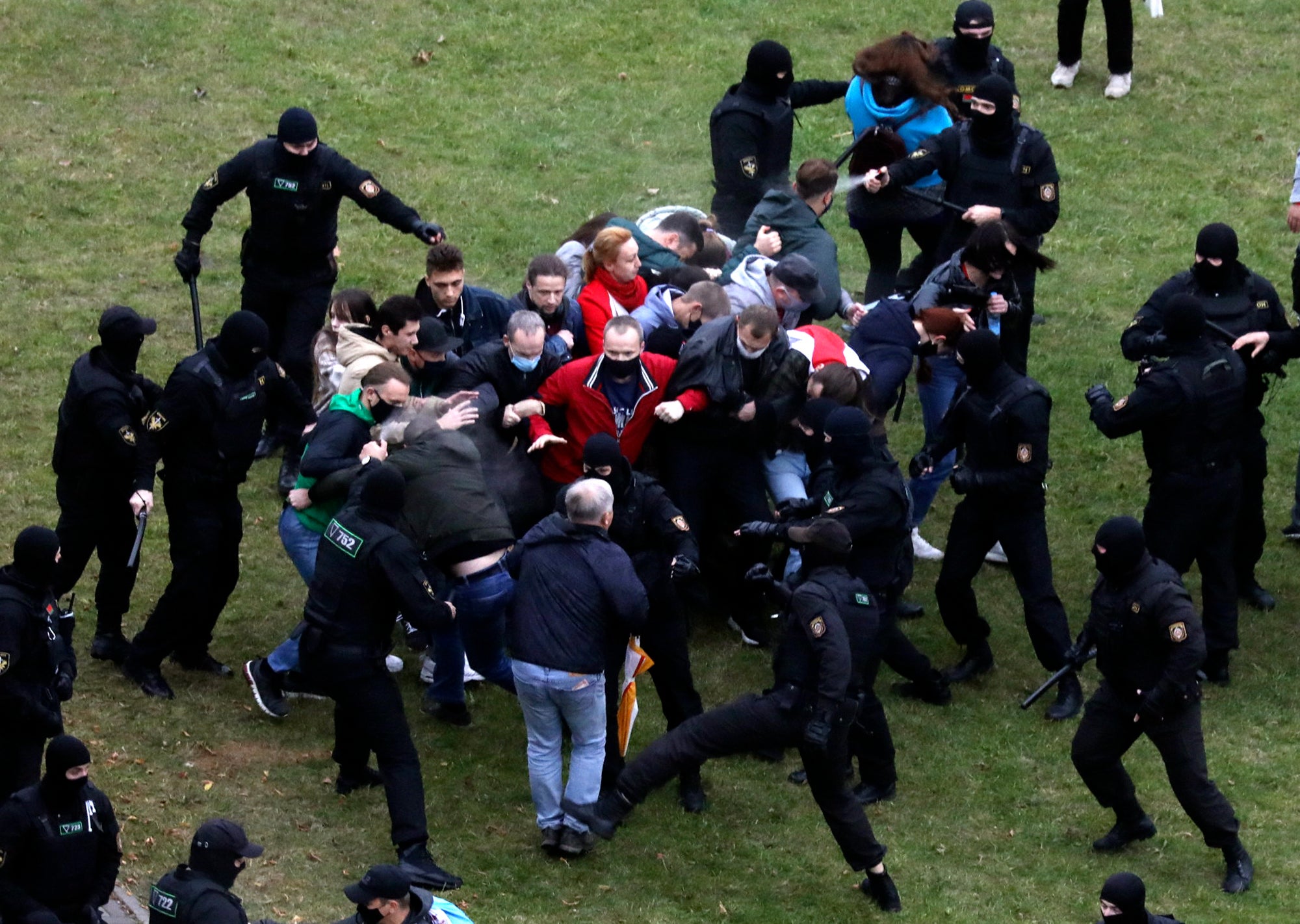Belarus ramps up crackdown on protests, detains over 700
Police in Belarus detained 713 people during Sunday's mass protests against reelection of the country’s authoritarian leader, the harshest crackdown on protesters in weeks

Over 700 people were detained in Belarus during mass protests against the re-election of the country s authoritarian leader in a disputed election — the harshest crackdown in weeks on protesters.
The Belarusian Interior Ministry reported Monday that 713 people were detained during rallies across the country a day before, and 570 of them remained in custody awaiting a court hearing.
In a separate statement, the ministry threatened to use firearms against the protesters “if need be," saying that the rallies “have become organized and extremely radical.”
The protests demanding the resignation of President Alexander Lukashenko spanned several cities on Sunday, with the largest crowds gathering in the capital, Minsk. The Viasna human rights center estimated that around 100,000 people took part in the Minsk rally. Police quickly moved to disperse the protest with water cannons, stun grenades and truncheons, preventing groups of people in different parts of the city from merging into one large gathering.
Dozens of people sustained injuries in what human rights advocates said was the harshest dispersal of a Sunday demonstration since August.
Despite the detentions, protests in Belarus continued Monday, with the elderly taking to the streets in several Belarusian cities, demanding Lukashenko’s resignation.
Over 2,000 older people marched through Minsk, chanting “Go away!” and carrying signs saying “Grandmothers (stand) with the people” and “Our souls are scarred with terror.” Several people were detained.
Mass protests have rocked Belarus since Aug. 9, when the results of the presidential election handed Lukashenko a victory with 80% of the vote and his main challenger Sviatlana Tsikhanouskaya only 10%. Tsikhanouskaya and her supporters refused to recognize the results of the vote, saying it was riddled with fraud, and some poll workers have backed up that claim.
Both the European Union and the United States have said that presidential election was neither free nor fair.
In the first days of the protests, Belarusian authorities cracked down brutally on protesters, with police detaining thousands and beating scores.
The violent response to the rallies prompted international outrage. The EU and the United States slapped dozens of Belarusian officials with sanctions for their roles in the alleged vote-rigging and the crackdown on protesters, but didn’t target Lukashenko, who has run the country for 26 years with an iron fist.
The government has since scaled back on the violence but has maintained the pressure, detaining hundreds of protesters and prosecuting top activists. Prominent members of the opposition’s Coordination Council, which was formed to push for a transition of power, have been arrested or forced to leave the country.
Over 40 journalists were detained over the weekend, 25 of them in Minsk, the Belarusian Association of Journalists said. Fifteen Belarusian journalists face 15 days of administrative arrest for disobeying police officers. Many had their equipment seized.
“The authorities are trying to prevent coverage of the protests by beating up and detaining journalists, withdrawing their accreditation and creating catastrophic working conditions,” Andrei Bastunets, head of the journalists' association, told The Associated Press.
Earlier this month Belarusian authorities rescinded the accreditation of all journalists working for foreign news outlets and said they must apply for new credentials, which some foreign outlets received last week. In September, the authorities also suspended the media credentials of the most popular Belarusian news site that has been extensively covering the protests.
Tsikhanouskaya, who is currently in exile in Lithuania after leaving Belarus under pressure from authorities, urged the EU to expand sanctions against Lukashenko and his allies.
“Yesterday we have seen the escalation of violence on the part of the authorities. Once again, hundreds of people are detained, beaten up, injured and crippled. Despite the peaceful nature of the protests, repressions are intensifying,” Tsikhanouskaya told the AP on Monday.
Lukashenko and his associates need to be added to the sanctions list along with law enforcement officers who take part in crackdowns on protesters, she added.
“I call on our European partners to act quickly and decisively,” Tsikhanouskaya said.
___
Follow all AP stories about developments in Belarus at https://apnews.com/Belarus.
Bookmark popover
Removed from bookmarks